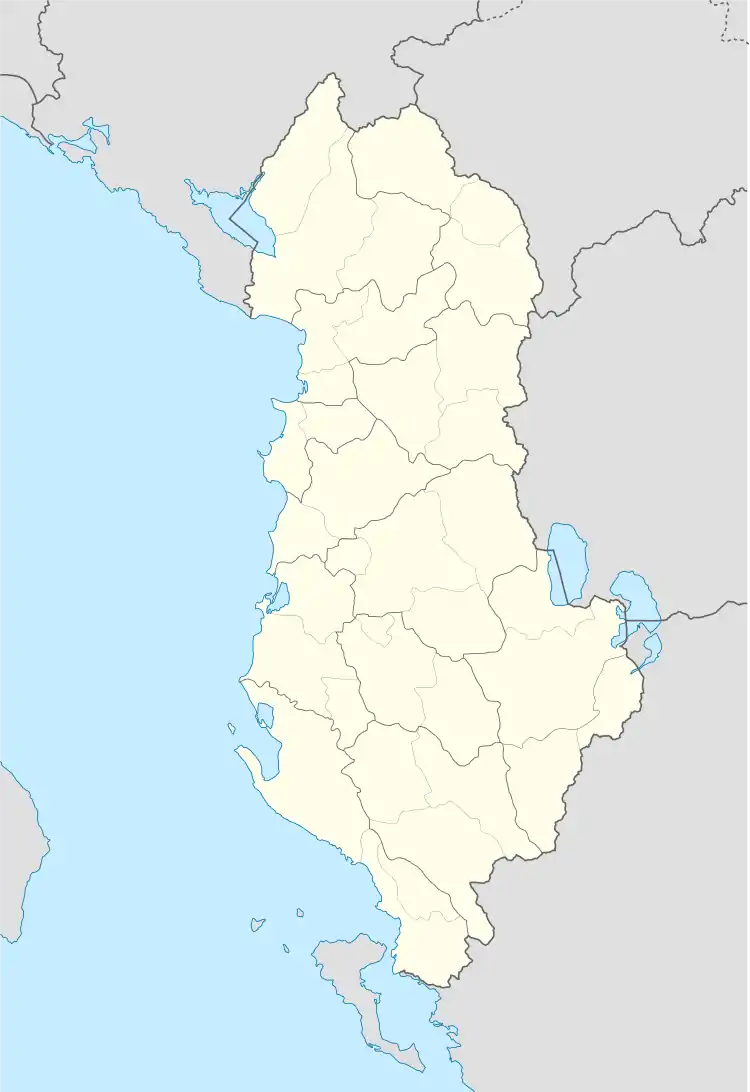Boriç i Vogël
Boriç i Vogël is a settlement in the former Gruemirë municipality, Shkodër County, northern Albania.[1] At the 2015 local government reform it became part of the municipality Malësi e Madhe.[2] The village is inhabited by a majority of Serb-Montenegrins, and minority of Albanians, and is part of the wider Vraka region inhabited by the Serb-Montenegrins. The village is called Stari Borič or Mali Borič in Serbian.
Boriç i Vogël | |
|---|---|
 Boriç i Vogël | |
| Coordinates: 42°7′52″N 19°30′0″E | |
| Country | |
| County | Shkodër |
| Municipality | Malësi e Madhe |
| Municipal unit | Gruemirë |
| Time zone | UTC+1 (CET) |
| • Summer (DST) | UTC+2 (CEST) |
Demographics
The village is inhabited by a community which hails from Montenegro, as is the case with many other in the region;[3] the Serb-Montenegrin community is present in the villages of Vraka.[4] They were until recently the only inhabitants of the village.[4] In 1990, out of a total of 75 households in the village, 67 were Orthodox Serb-Montenegrin, and 8 Albanian; out of 650 inhabitants, Serb-Montenegrins were 580 and the rest Albanian.[4] In recent times the Albanian term Vogël ("small") is increasingly used, in line with state regulations on non-Albanian toponyms being changed.[4]
During the early 2010s linguists Klaus Steinke and Xhelal Ylli seeking to corroborate villages cited in past literature as being Slavic speaking carried out fieldwork in settlements of the area.[5] Boriç i Vogël in the Shkodër area is one of a number of villages with a Slavophone population that speak a Montenegrin dialect.[5] The village Boriç i Vogël is inhabited by 15 families and the Slavophone families are the only compact group of the Orthodox in Vraka.[6]
History
In 1989 the Boriç i Vogël quarter was detached from the Boriç village.[7] In 1995, during the Yugoslav Wars, it was reported that there were incidents of violence against the Serb-Montenegrin minority in places like Boriç i Vogël and Boriç i Madh, where the Albanian government also tried to forcibly take land from them.[8] The Serb-Montenegrin minority in Shkodër and Malësia e Madhë claims to be treated unproperly.[9] Albanian police detained a number of people from the village, after resumption of trial of Beqir Leshevic accused of spying for the Yugoslav secret service.[9]
References
- "Location of Boriç i Vogël". Retrieved 26 August 2010.
- "Law nr. 115/2014" (PDF). Archived from the original (PDF) on 2015-09-24. Retrieved 2015-07-02.
- "Socialist Thought and Practice" (1–10). Jugoslavija. 1989: 20. Cite journal requires
|journal=(help) - Šćepanović 1991.
- Steinke, Klaus; Ylli, Xhelal (2013). Die slavischen Minderheiten in Albanien (SMA). 4. Teil: Vraka - Borakaj. Munich: Verlag Otto Sagner. ISBN 9783866883635. p. 9. "Am östlichen Ufer des Shkodrasees gibt es heute auf dem Gebiet von Vraka vier Dörfer, in denen ein Teil der Bewohner eine montenegrinische Mundart spricht. Es handelt sich dabei um die Ortschaften Boriçi i Madh (Borić Veli), Boriçi i Vogël (Borić Mali/Borić Stari/Borić Vezirov), Gril (Grilj) und Omaraj (Omara), die verwaltungstechnisch Teil der Gemeinde Gruemira in der Region Malësia e Madhe sind. Ferner zählen zu dieser Gruppe noch die Dörfer Shtoji i Ri und Shtoji i Vjetër in der Gemeinde Rrethinat und weiter nordwestlich von Koplik das Dorf Kamica (Kamenica), das zur Gemeinde Qendër in der Region Malësia e Madhe gehört. Desgleichen wohnen vereinzelt in der Stadt sowie im Kreis Shkodra weitere Sprecher der montenegrinischen Mundart. Nach ihrer Konfession unterscheidet man zwei Gruppen, d.h. orthodoxe mid muslimische Slavophone. Die erste, kleinere Gruppe wohnt in Boriçi i Vogël, Gril, Omaraj und Kamica, die zweite, größere Gruppe in Boriçi i Madh und in Shtoj."
- Steinke & Ylli 2013 p. 108. "Boriçi i Vogël - Borić Mali / Stari / Vezirov. Mit ungefahr 15 Familien bilden die Slavophonen von Boriçi i Vogël die einzige kompakte Gruppe der Orthodoxen in Vraka."
- "JPRS Report: East Europe" (81–90). United States Foreign Broadcast Information Service. 1989: 1. Cite journal requires
|journal=(help) - "FBIS Daily Report: East Europe" (136–146). United States Foreign Broadcast Information Service. 1995. Cite journal requires
|journal=(help) - "FBIS Daily Report: East Europe" (83–94). United States Foreign Broadcast Information Service. 1995: 2. Cite journal requires
|journal=(help)
Sources
- Šćepanović, Slobodan (1991) [1990]. Најновији демографски и други подаци о Враки/Najnoviji demografski i drugi podaci o Vraki. Зборник радова са међународног научног скупа одржаног на Цетињу 21, 22. и 23. јуна 1990. године. Titograd: Историјски институт СР Црне Горе.

